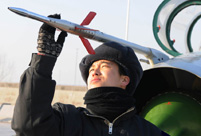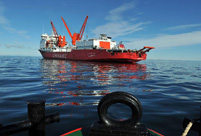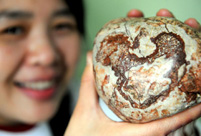 Int'l Snow Sculpture Art Expo in Harbin
Int'l Snow Sculpture Art Expo in Harbin Sichuan money wall for dividend payment
Sichuan money wall for dividend payment Li Na crashes Belinda Bencic in 2nd round at Australian Open
Li Na crashes Belinda Bencic in 2nd round at Australian Open
 Shocking moments when PLA's weapons open fire
Shocking moments when PLA's weapons open fire Famous Lanzhou beef noodles
Famous Lanzhou beef noodles Armed Police hold anti-terrorism drill in SE China's Xiamen
Armed Police hold anti-terrorism drill in SE China's Xiamen Harbin Int'l Ice and Snow Festival opens
Harbin Int'l Ice and Snow Festival opens 'Jin' named the word of the year by cross-strait netizens
'Jin' named the word of the year by cross-strait netizens Chinese scientific expedition goes to build new Antarctica station
Chinese scientific expedition goes to build new Antarctica station
BEIJING, Jan. 17 -- As smog continued over parts of China on Friday, lawmakers at the ongoing annual legislative sessions fiercely discussed ways to improve air quality.
Control of pollution will be a priority for the government of northern China's Hebei Province, home to seven of the country's 10 most polluted cities, while the Beijing mayor declared "all-out effort" on the problem.
Official statistics over a period of 52 years show the number of smoggy days at a record high in 2013. More than 100 big- and medium-sized cities in 25 provincial-level regions were affected by smog.
The pollution has been blamed for a decline of tourists visiting smoggy regions that were once known for their tourist attractions.
Taking the example of Beijing, the capital saw a decline of inbound tourists last year for the first time since 2008. Tourists arriving fell 14.3 percent in the first half of 2013 compared with the same period in 2012.
WAR AGAINST CHOKING AIR
The increased frequency and duration of smog is the target of much discontent on Chinese social media, where millions of Chinese fear their health is being jeopardized by the side effects of decades of unchecked economic expansion.
The ruling Communist Party of China and the central government are taking a multi-pronged approach to the problem.
A five-year action plan unveiled by the central government in Sept. 2013, cuts coal use, shuts down polluters, promotes cleaner production and cuts the density of inhalable particulate matter. Putting the ambitious ideas in practice will cost an estimated 1.75 trillion yuan (around 290 billion U.S. dollars).
The CPC has also changed its system for evaluating the performance of government and party officials, once focused almost exclusively on GDP. In a key reform blueprint released by the new generation of CPC leadership in November 2013, protection of the environment and ecosystem were given much more weight in assessing officials' achievements.
Ordinary people in China have come up with their own ideas to deal with the smog that regularly cripples traffic and causes many other inconveniences.
Pilots were asked to use a system to aid landing when smog reduces visibility. In December 2012, a primary school in Shijiazhuang, capital of Hebei Province, invented a set of gymnastics said to help students to inhale less polluted air.
BIG CHALLENGE
It will be a huge challenge to clean the Chinese sky in such a short period of time, said Liu Hongnian, a meteorology professor at Nanjing University.
He believes regional air pollution is directly related to the layout of high polluting enterprises.
"Air pollutants are prone to accumulation in certain regions but are spreading fast to other places, making it a difficult problem to tackle without joint efforts from different regions," he said.
In 2013, China's smog belt began to stretch from the developed regions of the Yangtze and Zhujiang river deltas and the area around Beijing and Tianjin,to other localities where smog was previously seldom seen. The southernmost province of Hainan and autonomous region of Tibet have recorded smoggy days.
Growing social consumption of fossil fuels is seen as the major source of increased air pollutants, while photochemical pollution, cooking and vehicle emissions also contribute to the phenomenon, according to a report released by the Chinese Academy of Social Sciences in November last year.
Despite a government pledge to cut consumption of fossil fuel to below 65 percent of primary energy use by 2017, coal still fuels most of China's electricity, making it difficult to eradicate smog in such a short time, said Wang Jinnan, deputy head of the Chinese Academy for Environmental Planning.
China needs to break its addiction to coal and use its natural resources more efficiently if it wants to end air pollution, Wang said, while advocating control of the number of cars and promotion of the development of clean energy.
While introducing forceful measures to reduce air pollution, Wang pointed out that government officials should also be aware of advancing economic development.
 Su-30 fighter formation taking off for training
Su-30 fighter formation taking off for training  Xuelong carries on mission after breaking from floes
Xuelong carries on mission after breaking from floes Charity exhibition raises money for panda protection
Charity exhibition raises money for panda protection 'Map of China' on the stone
'Map of China' on the stone  Chinese naval escort taskforce repels 4 suspicious vessels
Chinese naval escort taskforce repels 4 suspicious vessels World's weekly photos (1.6-1.12)
World's weekly photos (1.6-1.12) Li Na crashes Belinda Bencic in 2nd round at Australian Open
Li Na crashes Belinda Bencic in 2nd round at Australian Open Weekly sports photos
Weekly sports photos China's national pole dancing to play 'The Butterfly Love'
China's national pole dancing to play 'The Butterfly Love'  The never-ending Silk Road
The never-ending Silk Road  Spring Festival travel rush: One window, one world
Spring Festival travel rush: One window, one world Int'l Snow Sculpture Art Expo in Harbin
Int'l Snow Sculpture Art Expo in Harbin China photographs internal structure of water molecule
China photographs internal structure of water molecule 'Predator' makes proposal to girlfriend
'Predator' makes proposal to girlfriend Thousands of fish frozen on Norway sea
Thousands of fish frozen on Norway seaDay|Week|Month